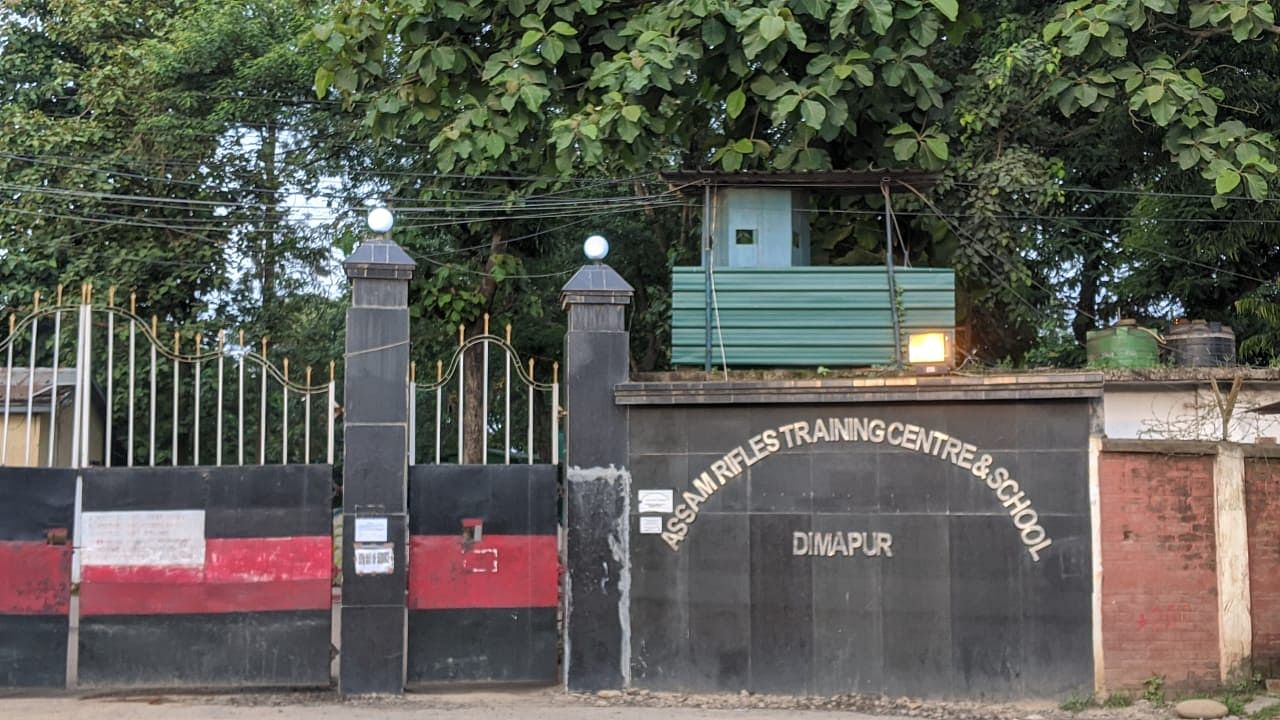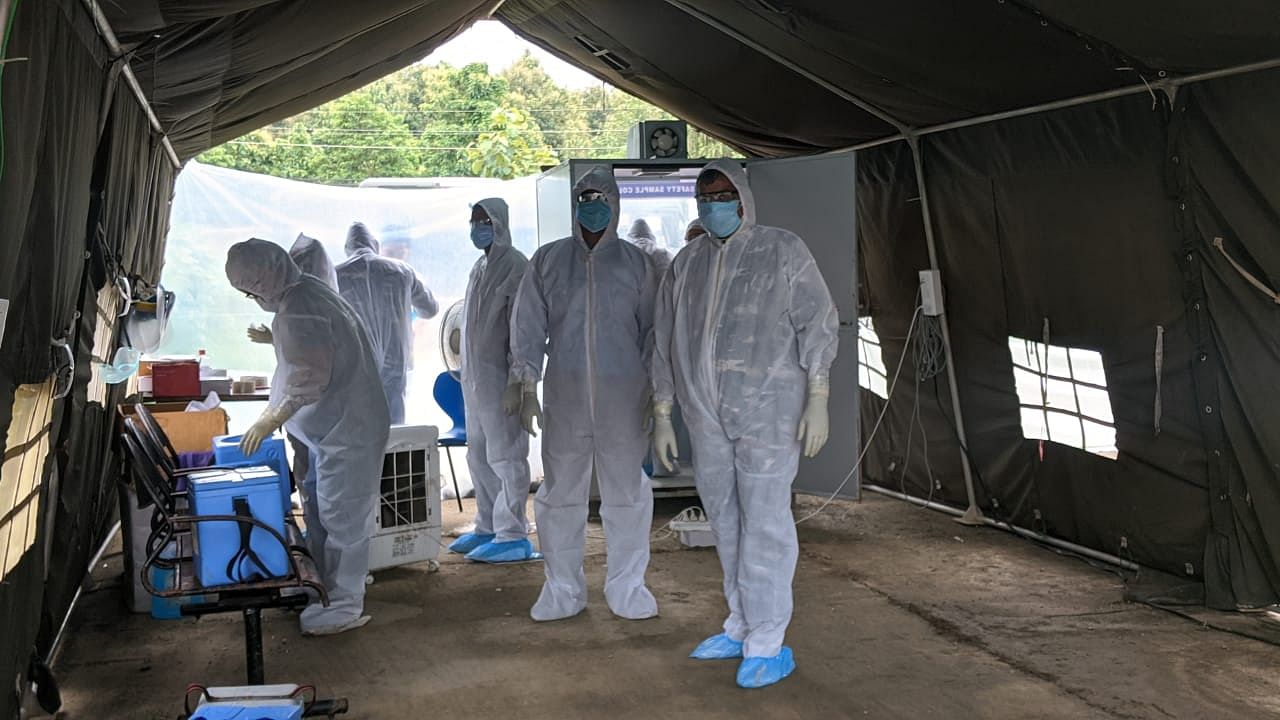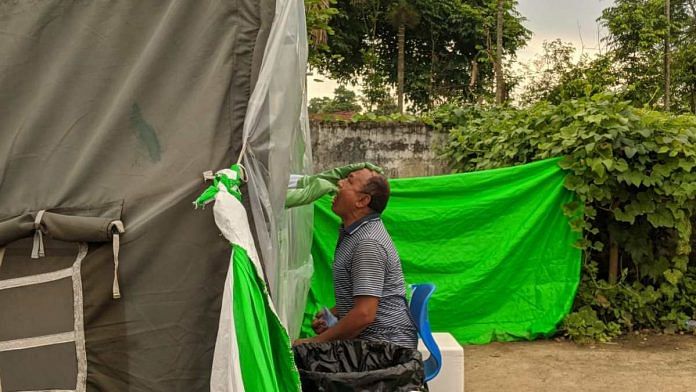Dimapur: As the flow of migrant returnees decreased in Nagaland, the state found itself facing another challenge this month — a surge in Covid-19 cases among paramilitary personnel returning from leave.
So far, according to state government data, at least 187 personnel of the Assam Rifles, Central Reserve Police Force (CRPF) and the Border Security Force (BSF) have tested positive in Kohima and Dimapur.
On Monday, the state witnessed its largest daily spike of 71 cases. Among them, state government data shows, 55 were from the Assam Rifles (including 39 from the Assam Rifles Training Centre), and five from the Central Reserve Police Force (CRPF), all in Dimapur, the commercial capital of Nagaland.
Health officials in the state say the spurt in cases began this month, after a large number of personnel whose leaves had been extended in light of the Covid-19 lockdown were called back to Nagaland.
“We need to contain this problem. The flow of military and paramilitary forces doesn’t stop because the orders come from the ministry (at the Centre) and we also know the constraints they have,” said Dr Vizolie Z. Suokhrie, the principal director of health and family welfare.
“But my government is open to having a discussion with anyone on the issue. This will be a big issue for a small state like Nagaland.”
The 60 Assam Rifles and CRPF personnel diagnosed with Covid-19 were among 165 people tested, which translates to a high positivity rate.
When asked about the high number of cases among security personnel, a state government official and a source within the Assam Rifles raised concerns about the quarantine centres of the paramilitary force, hinting at possible laxity in the implementation of rules.
The public relations officer (PRO) of the Assam Rifles, however, said they were following Covid-19 protocol. “Social distancing is followed strictly by all personnel, including families. Separate barracks with separate eating and toilet facilities have been created to ensure proper segregation of quarantined personnel from others,” the PRO added.
The CRPF PRO denied there had been multiple cases among personnel posted in the state. According to their records, the PRO said, only one trooper in Nagaland had been diagnosed with Covid-19.
Also Read: Assam reverses 11-day Covid duty for doctors after IMA calls out govt’s ‘whimsical decision’
Dimapur on edge
Nagaland is one of India’s eight northeastern states. The government website says the state is often compared to Switzerland for its picturesque landscape. Apart from its natural beauty, Nagaland is also known as a cradle of culture, especially music, with the state’s famed Hornbill Festival emerging as a huge draw for arts enthusiasts from around the country.
However, like much of the northeast, it is home to an international border (with Myanmar) and has witnessed a bloody insurgency movement. A heavy security deployment has thus become a permanent fixture in Nagaland, as it has in many of the other northeastern states.
Nagaland had zero Covid-19 cases until the central government allowed inter-state travel on 4 May. Its first case was reported on 25 May, but the state has recorded no Covid-19 deaths so far.
As of Thursday, it had reported 902 Covid-19 cases, of which 348 have been cured.
Dimapur, which borders Assam and houses the state’s only airport and railway station, received the maximum number of returnees.
According to data shared by the home department, Nagaland had received 18,281 returnees until 12 July.
The first alarm bells were sounded on 4 June when 22 passengers of a special train coming in from Chennai tested positive. Over a month later, that situation appears to have been brought under control, but the infections among security personnel pose a new challenge.
“The army and paramilitary personnel who were stuck because of the lockdown started returning to duty. So lots and lots are coming everyday since all the normal trains are coming now and they are coming from the various corners of India,” Dr Tiasunep Pongener, the Chief Medical Officer (CMO) of Dimapur, told ThePrint.
The protocol set by the state requires all incoming passengers to undergo a mandatory quarantine of 28 days i.e. 14 days in institutional quarantine and 14 under self-isolation at home.
During the first 14 days, all returnees are tested and released for home quarantine only if found to be Covid-negative.
Unlike other returnees who are being kept at government or paid centres (primarily hotels), the paramilitary and military personnel are undergoing quarantine in designated centres on the premises of the security forces.
Responding to a question on the high positivity rate among security personnel, Pongener said, “Something is seriously wrong inside the quarantine centre at the Assam Rifles camp. Last week, I visited the Assam Rifles Training Centre at Sukhovi (in Dimapur). There were three quarantine centres inside the camp, just from one block we got 16 positive cases.”

A source in the Assam Rifles said the situation worsened after 5 July, when a large number of personnel returned to the state by Rajdhani Express.
“After that, they were kept in the quarantine facility. They then started showing symptoms and were sent for testing. While their results were being processed, they were kept in the medical room. But they had still mingled with the others in the initial two or three days of their quarantine. So that was the reason,” the source added.
“We don’t have individual rooms, we have barracks, we have maintained distance but the bathrooms are not separate for individuals — so they have been instructed to take precautions and sanitise bathrooms whenever they use it,” the source said. “Sometimes there can be lax behaviour, we can’t rule it out.”
The Dimapur health department said a total of 103 paramilitary personnel had tested positive in the city — 93 from the Assam Rifles and 10 from the CRPF.
Meanwhile, the Kohima health department confirmed 84 cases among paramilitary as well as military personnel. “As of now, we can manage it, but if it keeps on increasing, problems will start,” Kohima CMO Dr Vezokhulu Theyo said.
Also Read: Registration, Covid test, mass quarantine — how Assam’s Dhubri coped with big migrant influx
Mitigation plans
As the number of cases spiked, the Dimapur health department struggled to accommodate them at its Covid care centres, i.e. a 100-bed nodal facility at the district hospital and the 50-bed centre at the Assam Rifles Hospital.
The Assam Rifles Hospital could only accommodate five of the CRPF personnel while 16 Assam Rifles troopers were sent to the district hospital, which had already been treating other patients, the CMO said. The remaining 39 were kept in isolation at the Assam Rifles Training Centre camp.
According to Pongener, they will be moved to the Industrial Training Institute (ITI) Kushiabill in Dimapur, which was earlier being used as a quarantine centre for returnees.
Meanwhile, to keep the returning troopers away from civilians, the administration has designated a separate swab collection facility for them in a block of the training institute. On Tuesday, on the CMO’s suggestion, five doctors from the CRPF and the Assam Rifles camp undertook training in swab collection.

“What we are suggesting is, let the paramilitary forces come, we are there to support them. The best thing that could happen is they take care of their own containment, doctors, nurses, health facility. We will support them, but let everyone take care of their own containment procedures,” the principal director said.
“We will assess and also contain the camps if required,” he added. “So far, in Nagaland, containment is not required since everything is alright except for a few areas where we have had to tighten it up. But if it is required in the future, we will have to do it.”
The Assam Rifles source said the number of personnel returning from leave will also be reduced to keep a check on the situation.
Also Read: Covid hit first, then floods — how Assam’s Goalpara handled both with ‘no time to prepare’
An NE problem
A similar situation seems to be transpiring in the other northeastern states. On Tuesday, Meghalaya Chief Minister Conrad Sangma tweeted that the state’s 316 Covid-19 cases included 186 Border Security Force (BSF) personnel.
#COVID19 Update | #Meghalaya
Total Active Cases 270
Total BSF- 186
Total Non BSF- 84Recovered- 46
— Conrad Sangma (@SangmaConrad) July 14, 2020
In Mizoram, there were 64 paramilitary personnel among 238 Covid-19 cases as of Wednesday. Tripura, which was the first state to report cases among paramilitary forces in the region, had reported over 200 cases among BSF personnel until last month.
At the time, Tripura Chief Minister Biplab Kumar Deb had told reporters that the spurt had been caused by the troops violating Covid-19 protocol, including social distancing measures.
Also Read: Not surprised, way of life, say those from northeast over racist ‘corona’ attacks



